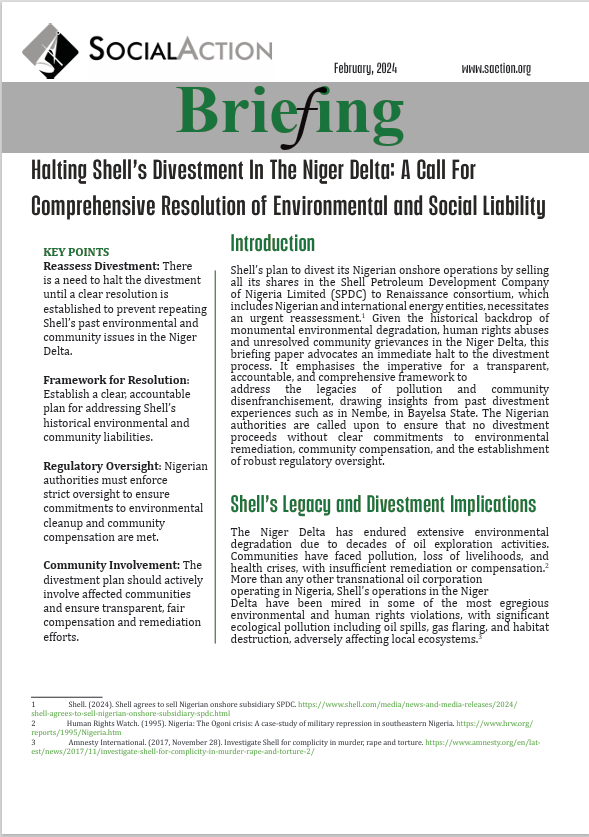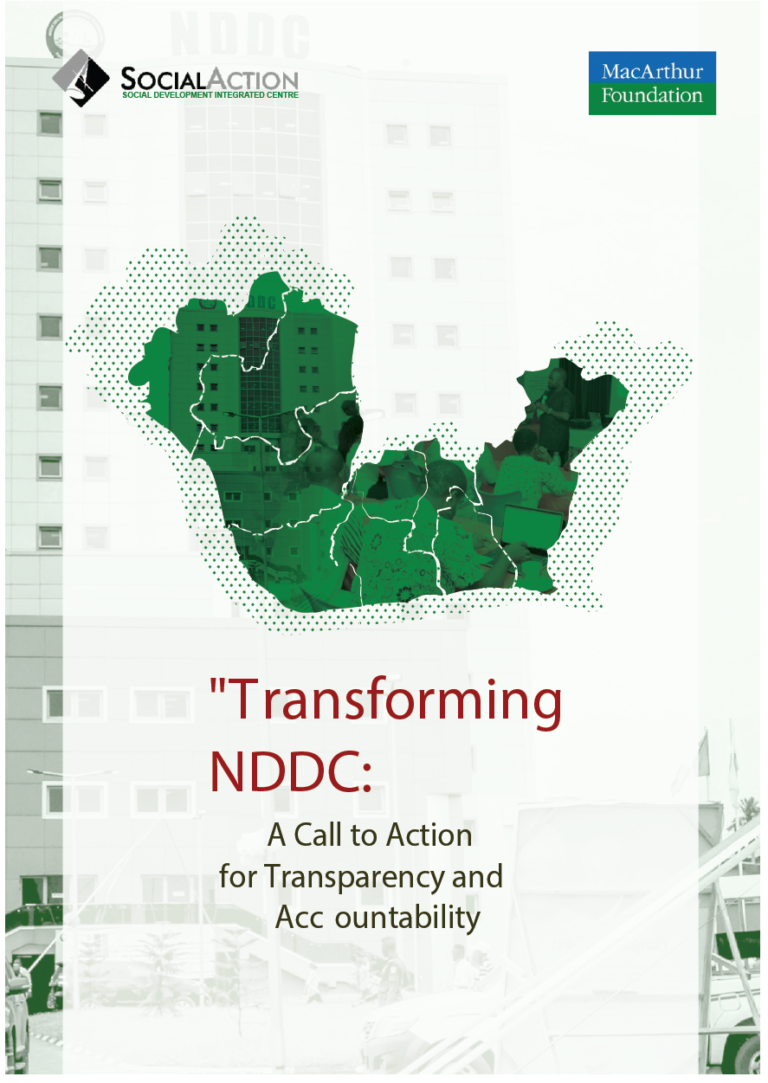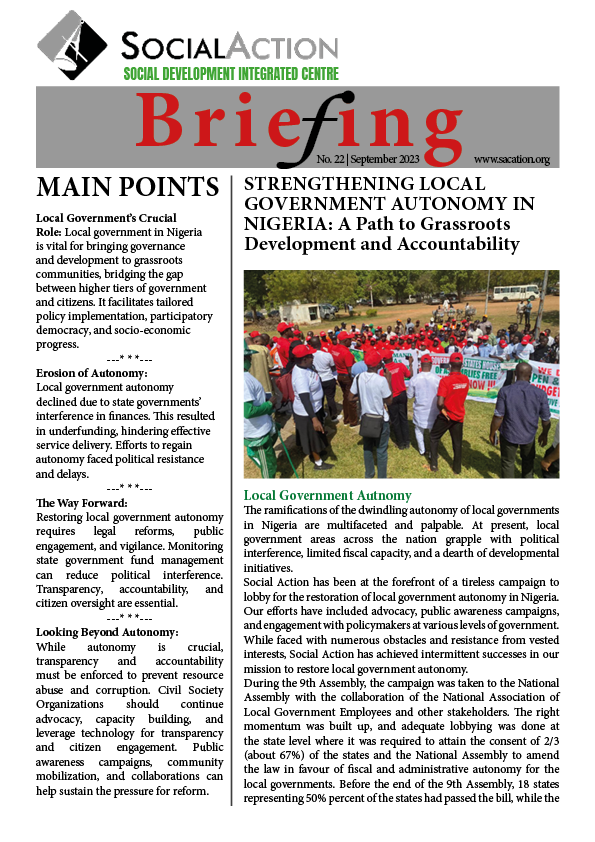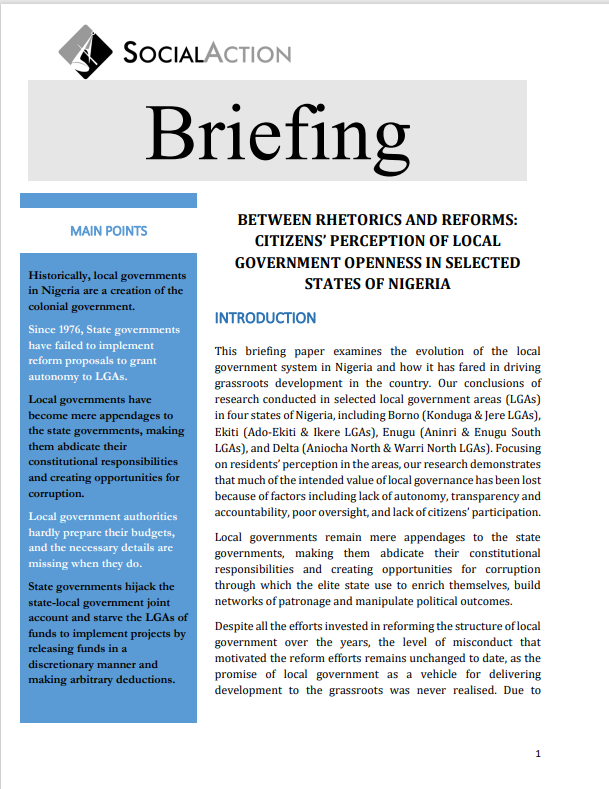Halting Shell’s Divestment in the Niger Delta: A Call for Comprehensive Resolution of the Environmental and Social Liabilities
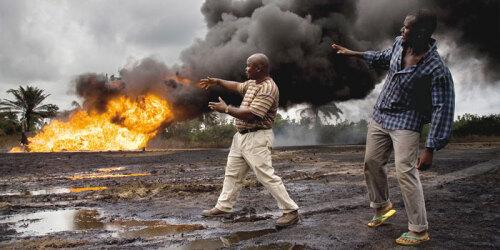
Introduction
Shell’s plan to divest its Nigerian onshore operations by selling all its shares in the Shell Petroleum Development Company of Nigeria Limited (SPDC) to the Renaissance consortium, which includes Nigerian and international energy entities, necessitates an urgent reassessment.[1] Given the historical backdrop of monumental environmental degradation, human rights abuses and unresolved community grievances in the Niger Delta, this briefing paper advocates an immediate halt to the divestment process. It emphasises the imperative for a transparent, accountable, and comprehensive framework to address the legacies of pollution and community disenfranchisement, drawing insights from past divestment experiences such as in Nembe, in Bayelsa State. The Nigerian authorities are called upon to ensure that no divestment proceeds without clear commitments to environmental remediation, community compensation, and the establishment of robust regulatory oversight.
Shell’s Legacy and Divestment Implications
The Niger Delta has endured extensive environmental degradation due to decades of oil exploration activities. Communities have faced pollution, loss of livelihoods, and health crises, with insufficient remediation or compensation.[2] More than any other transnational oil corporation operating in Nigeria, Shell’s operations in the Niger Delta have been mired in some of the most egregious environmental and human rights violations, with significant ecological pollution including oil spills, gas flaring, and habitat destruction, adversely affecting local ecosystems. [3]
Overview of Shell’s Divestment Strategy
Shell’s divestment plans in the Niger Delta involve selling off its shares in the Shell Petroleum Development Company of Nigeria Limited (SPDC) to Renaissance Africa Energy Company, a consortium of Nigerian and foreign companies and shifting its focus to more lucrative deep offshore exploration and production sites. This strategic move is part of a broader trend among International Oil Companies (IOCs) to divest from areas fraught with challenges created by decades of Shell’s impunity. The implications of Shell’s divestment for the broader Niger Delta region are multifaceted and significant. This move is pending approval from the Nigerian Federal Government.
| Oloibiri/Otuabagi: The site of Nigeria’s first oil well, discovered in 1958, reveals a community still grappling with the consequences of early oil exploration after Shell abandoned its oil wells to rust and pollute without proper decommissioning. Oloibiri remains one of the least developed areas in the Niger Delta, with residents facing environmental pollution, poverty, and a lack of basic social amenities. [4] Umuechem: In 1990, Shell requested “security protection” from an elite paramilitary police unit at its facility in Umuechem village, where peaceful protests were taking place. Over the next two days, the Mobile Police attacked the village with guns and grenades, killing at least 80 people and burning the entire town.[5] Ogoniland: Shell’s operations in Ogoniland have been associated with severe and widespread human rights violations, many of which also amounted to criminality. Shell repeatedly encouraged the Nigerian military to deal with community protests, even when it knew the horrors this would lead to – unlawful killings, rape, torture, the burning of villages. Nembe: Shell paid rival local contractors that used armed gangs to unleash violence between Ogbolomabiri and Basambiri communities before selling its assets to Nigerian companies in the area to complicate legacies of pollution and social tensions. Rumuekpe: Shell is implicated in a decade of human rights abuses. Shell is said to have transferred more than $159,000 to a group credibly linked to militia violence. The gang became locked in competition with a rival group over access to oil money, with payments to one faction provoking a violent reaction from the other. The entire town was destroyed, with many residents killed in Shell fuelled violence. [6] Bodo City: Shell’s operations led to two massive oil spills in 2008 and 2009, causing extensive environmental damage and devastating the livelihoods of tens of thousands of people. Shell initially claimed that only 1,640 barrels of oil were spilled in total but later admitted it was closer to 50,000 barrels after years of community litigation.[7] Ekpan: Shell’s operations have been linked to numerous oil spills, resulting in significant environmental degradation. The spills have contaminated local water sources, leading to health issues among the local population and impacting fishing, a significant source of income for the community.[8] |
Shell’s divestment strategy in the Niger Delta is perceived as an effort to evade accountability for the environmental harm caused by its long-term oil activities. By selling its shareholding in SPDC to Nigerian firms, Shell aims to distance itself from the significant costs of cleaning up pollution and compensating affected communities. The lack of transparency in the shareholding and asset transfer process heightens these concerns. Local companies’ takeover of these assets threatens to exacerbate the already critical pollution issues, as these companies may deny responsibility for remediating sites devastated by Shell over the past decades. Any hasty divestment by Shell risks worsening the environmental degradation and undermines the pursuit of justice and fair compensation for the communities impacted by Shell’s operations. Ultimately, Shell’s divestment approach appears to be a strategic withdrawal from its responsibilities, potentially burdening the region and its inhabitants with the enduring effects of its operational legacy:
Environmental Liability and Cleanup: The divestment raises critical questions about responsibility for past and ongoing environmental damages due to oil pollution. With assets changing hands, there is concern about the commitment of new local owners to address legacy pollution issues and invest in necessary cleanup and remediation efforts.
Community Impact and Voice: Shell’s sale of shares in SPDC, as with the previous transfer of asset ownership to Nigerian firms, markedly diminishes the local communities’ leverage in addressing their concerns through legal or protest channels. Nembe’s experience, where Shell’s divestment to Aiteo sparked debates over ongoing pollution responsibility and cleanup adequacy, exemplifies the need for more transparent and community-inclusive divestment practices.
Social Liabilities: The longstanding violent conflicts in communities like Nembe, Rumuekpe and others fueled by oil-related disputes highlight the intricate relationship between communities and transnational oil and gas companies. The contentious awarding of cleanup contracts and oil spill management has often intensified these tensions, underscoring the necessity for equitable and transparent divestment.
Regulatory Oversight and Legal Clarity: The minimal involvement of regulatory bodies in supervising asset transactions and ensuring the addressing of environmental liabilities raises alarms about the efficacy of existing frameworks to safeguard community rights and ecological integrity amidst divestment. The 2021 Nembe Santa Barbara Well blowout, following earlier Shell divestment from the area, further illuminates the challenges faced by new owners in managing inherited infrastructures and the pressing need for explicit legal stipulations regarding pre-divestment pollution liability.
Community Rights and Participation: Frequently, the divestment process overlooks the aspirations and rights of local communities, who might wish to partake in asset acquisitions or ensure the acknowledgment of environmental and social liabilities. The demands made by the Nembe Chiefs Council post the divestment of OML 29 to Aiteo reflect a communal call for accountability, environmental remediation, and fair compensation for the decades of pollution and socio-economic challenges faced by the community due to oil exploration activities and a desire more direct involvement and stake in the operations and benefits derived from their local resources.
Nigerian Law on Divestment
Section 95 of the Nigerian Petroleum Industry Act 2021outlines the regulatory framework governing the assignment, transfer, or novation of petroleum licenses and leases in Nigeria. It stipulates that such transactions gain the prior written consent of the Minister (of Petroleum), based on the Nigerian Upstream Regulatory Commission’s recommendation. This Section ensures that any change in control of license or leaseholders must have regulatory approval. It mandates submitting an application for transfer approval to the Commission, along with pertinent information per the Commission’s regulations. The Act allows license or leaseholders to secure their interests for financial reasons, provided they obtain the Commission’s consent. The Commission is required to act on the application “within” six months. Failure to respond is deemed an approval. Similarly, the Minister must approve the Commission’s recommendation “within” six months. Failure to act within the timeframe would be deemed an approval.
It is imperative that, among other considerations, the Nigerian authorities examine Renaissance Africa Energy Company’s financial capacity for addressing the environmental damages caused by Shell in the Niger Delta. Given the extensive pollution, it’s critical to ensure the consortium can meet remediation obligations. Without clear evidence of sufficient financial resources, Nigerian authorities have the right under Section 95 of the Petroleum Industry Act 2021 to halt the divestment, safeguarding the Niger Delta’s environment.
| Lessons from Nembe and the Niger Delta Divestments Nembe exemplifies the complexities and consequences of Shell’s divestment strategy in the Niger Delta, particularly highlighting issues of liability, legacy pollution, and community engagement. In 2014/15, Shell divested its 30 percent stake in OML 29 and the Nembe Creek Trunk Line to the Nigerian company Aiteo, raising significant concerns about ongoing and future responsibilities for environmental cleanup and remediation. This divestment, characterized by a lack of transparency and minimal public oversight, left many questions unanswered regarding the accountability for past pollution damages. Nembe, housing Bayelsa’s largest onshore oil fields and a history of over 30 years of violent conflicts exacerbated by oil-related disputes, is a poignant example of the social and environmental fallout from such divestments.[9] The secretive nature of Shell’s asset sales, with little to no involvement of the affected communities or clear discussion on the transfer of liabilities, has made it challenging for local representatives to seek redress or engage effectively with the new Nigerian operators. The Nembe incident, particularly the 2021 Santa Barbara wellhead blowout, underscores the dire implications of transferring assets without adequate provisions for liability and without involving the communities in the negotiation processes.[10] The Nembe Chiefs Council’s demands following the divestment reflect the community’s calls for equity participation, fulfillment of previous commitments, and a formal introduction of new operators, highlighting the broader need for transparent divestment processes, community participation, and clear legal frameworks to address liability and ensure environmental and social justice in the wake of IOC divestments. |
Key Concerns and Recommendations
Transparent Resolution of Historical Liabilities: It is paramount that Shell and the Renaissance consortium clearly outline their commitments to remediate environmental damage and resolve community disputes as integral components of the divestment agreement. This includes comprehensive cleanup of polluted sites and equitable compensation for affected communities.
Regulatory Oversight and Accountability: The divestment process must be underpinned by strengthened regulatory frameworks that ensure stringent compliance with environmental and social standards. This entails the prior establishment of rigorous monitoring mechanisms, independent audits, and enforceable penalties for non-compliance.
Community Engagement and Compensation: The divestment plan must ensure meaningful engagement with affected communities, incorporating their input and addressing their concerns transparently. Fair compensation and remediation commitments must be clearly defined and adhered to, reflecting a genuine commitment to redress past injustices.
Assessment of New Operators’ Capabilities: The Nigerian regulatory authorities must rigorously assess the technical, financial, and managerial capacities of the Renaissance consortium to address the Niger Delta’s environmental challenges responsibly. This assessment should include a clear plan for spill prevention, emergency response, and environmental restoration.
Halt on Divestment: Given the significant risks and concerns associated with the divestment, this briefing paper advocates an immediate halt to the process. The Nigerian authorities should not approve the divestment until a comprehensive and transparent framework, acceptable to the affected communities and civil society observers, is established, addressing all environmental and social liabilities to the satisfaction of all stakeholders, including affected communities.
Establishment of an Environmental Restoration Fund: A dedicated fund, contributed to by Shell, the Renaissance consortium, and potentially international partners, should be established specifically for environmental restoration and community development projects in the Niger Delta. This fund should be managed transparently, with active participation from community representatives and environmental experts.
Conclusion
The proposed divestment of Shell’s onshore operations in the Niger Delta represents a critical opportunity to address the longstanding environmental and social challenges that have plagued the region. However, this opportunity must not be squandered by a hasty or inadequately planned divestment process. This briefing paper calls on the Nigerian authorities to halt the divestment until a clear, comprehensive, and accountable plan is in place, ensuring that the legacies of pollution and community disenfranchisement are effectively addressed. Only through a responsible and transparent divestment process, underpinned by robust regulatory oversight and genuine community engagement, can the Niger Delta begin to heal and move towards a sustainable and equitable future.
[1] Shell. (2024). Shell agrees to sell Nigerian onshore subsidiary SPDC. https://www.shell.com/media/news-and-media-releases/2024/shell-agrees-to-sell-nigerian-onshore-subsidiary-spdc.html
[2] Human Rights Watch. (1995). Nigeria: The Ogoni crisis: A case-study of military repression in southeastern Nigeria. https://www.hrw.org/reports/1995/Nigeria.htm
[3] Amnesty International. (2017, November 28). Investigate Shell for complicity in murder, rape and torture. https://www.amnesty.org/en/latest/news/2017/11/investigate-shell-for-complicity-in-murder-rape-and-torture-2/
[4] Orient Energy Review. (2023, February 23). Oloibiri: Reminiscing on Shell’s pioneer oilfield. https://www.orientenergyreview.com/local-content/oloibiri-reminiscing-on-shells-pioneer-oilfield/.
[5] Amnesty International. (2017, November 28). Investigate Shell for complicity in murder, rape and torture. https://www.amnesty.org/en/latest/news/2017/11/investigate-shell-for-complicity-in-murder-rape-and-torture-2/
[6] Vidal, J. (2011, October 3). Shell accused of fuelling Nigeria conflict. The Guardian. https://www.theguardian.com/world/2011/oct/03/shell-accused-of-fuelling-nigeria-conflict
[7] European Union Agency for Fundamental Rights. (2020). UK Case Study. https://fra.europa.eu/sites/default/files/fra_uploads/uk_case_study_2.pdf
[8] Change Management Insight. (2023, March 4). Shell change management case study. https://changemanagementinsight.com/shell-change-management-case-study/.
[9] Bayelsa State Oil and Environmental Commission. (2023). Report of the Bayelsa State Oil and Environmental Commission. Retrieved from https://report.bayelsacommission.org/.
[10] The 2021 Santa Barbara wellhead blowout in Nembe, Bayelsa State, is a significant environmental incident that highlights the challenges and risks associated with oil extraction in the Niger Delta, especially post-divestment. Owned by Nigerian company Aiteo, the well experienced a severe blowout on November 5, 2021, causing uncontrolled crude oil release into surrounding areas, leading to extensive environmental contamination. Initial response efforts were hampered by dense hydrocarbon fumes, and Aiteo struggled to contain the spill for over a month, eventually requiring the expertise of international specialists, Halliburton Boots and Coots, to seal the well. This incident underscores the need for improved asset maintenance, emergency preparedness, and stringent regulatory oversight to safeguard the environment and local communities in the oil-rich Niger Delta region.

